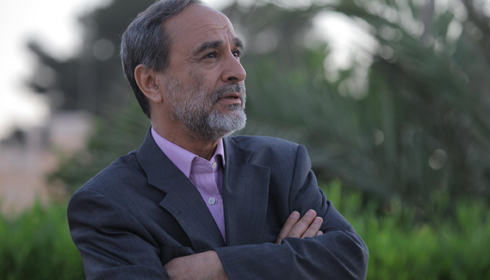By Valerie Stocker.
Tripoli, 15 November:
Congressman Abdurrahman Sewehli, head . . .[restrict]of the Union for Homeland Party (UHP) and chairman of Congress’ Defence Committee boycotted the new government’s oath-taking ceremony in protest at the inclusion of ministers who he says “do not meet the standards of integrity and patriotism”. He accuses them of having been too closely connected to the Qaddafi regime.
The ceremony held amidst tight security yesterday, Wednesday, in the hall of the Congress building in Tripoli saw 22 new ministers out of the 31 selected by Prime Minister Ali Zeidan sworn in.
In a short statement published last night on his party’s official Facebook page, Sewehli expressed disappointment with the choices made by Zeidan, who he claims “insisted on nominating collaborators of tyranny . . . whom he had been advised to exclude”. This, said Sewehli, ultimately made it impossible for himself to endorse the new government without betraying his guiding principle “New Libya – New Faces”.
The only minister mentioned specifically by Sewehli on his Facebook page is Ali Aujali, whom Zeidan selected as Minister of Foreign Affairs but who is still under investigation by the Integrity Commission.
The commission was set up to assess whether officials were too closely connected with the former regime and are sufficiently committed to the revolution to represent the “New Libya”. Five out of 31 ministerial portfolios are vacant at moment, as the Commission rejected four candidates for ministerial posts nominated by the Prime Minister: Interior Minister Ashour Suleiman Shuwail, Ali Mohammed Muhairiq (Electricity), Abdulasalm Bashir Duabi (Higher Education) and Muaz Fathi Al-Khoja (Minister for Relations with Congress).
A fifth Sami Al-Saadi, resigned the Martyrs and Missing portfolio.
The commission still has to make rulings on four other ministers: Ali Al-Aujali (Foreign Affairs), Kamla Khamis Al-Mazini (Social Affairs), Ahmed Ayad Ali Al-Urfi (Agriculture) and Abdulsalam Mohammed Abusaad (Religious Affairs and Awqaf).
Many in Libya were surprised at the composition of Zeidan’s cabinet, as it includes many unknown names as well as some who had held positions during the Qaddafi era. Aujali, the most notable example, is a career diplomat who was Libyan ambassador to the United States when the revolution began but was an early supporter of it.
Sewehli’s UH party has taken a firm stance against what it considers reconciliation without justice and keeping too many “old faces” in official positions, when Libyans are reshaping their political system and redefining their national identity.
Sewehli’s statement hints at tensions within the GNC and contradicting visions among policy-makers. He claims to have made sacrifices – such as not presenting himself for the position of prime minister and not trying to reserve any ministry for the UfH party – and to have given his support to Zeidan, “maybe even tipping the balance to his favor and assuring his victory”, only to be disappointed by “the candidate he deemed most qualified for the position”. [/restrict]








